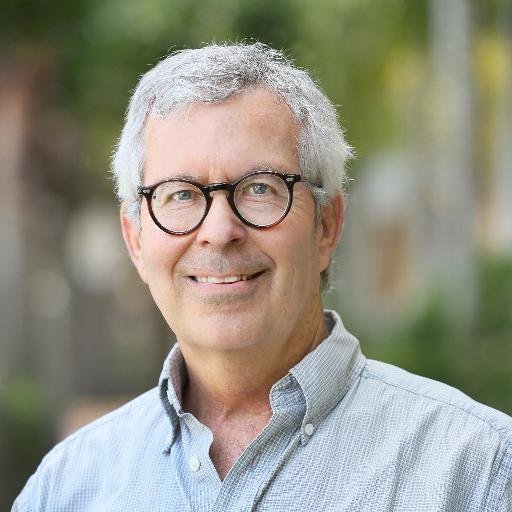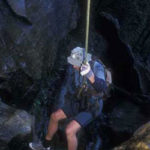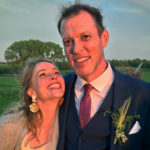Thomas Swick has been the Travel Editor of the South Florida Sun-Sentinel since 1989. Before moving to Fort Lauderdale he wrote editorials for a newspaper in Providence, RI, and medical stories for a magazine in Philadelphia. Prior to that he spent several years abroad, teaching English in Poland and Greece and working on a farm in France. His reviews have appeared in the New York Times Book Review and the Washington Post Book World; his articles and essays in The American Scholar, The Oxford American, The North American Review, Ploughshares, Commonweal, and National Geographic Traveler. Last year he wrote an incisive and influential critique of travel journalism, “Roads Not Taken,” for the Columbia Journalism Review. His essays have twice appeared in The Best American Travel Writing anthologies. He is the author of the travel memoir Unquiet Days: At Home in Poland.
How did you get started traveling?
Family drives to grandmother’s house (from western New Jersey to central Pennsylvania). I think if you’re a travel writer (or any kind of writer) your earliest trips make a deep impression.
Then came three important experiences:
1) Visiting as a grade schooler the 1964-65 New York World’s Fair, which gave me a taste for maps, streets, buildings and mingling with what seemed to me then all the conceivable races of the world.
2) Going as a junior in high school on a spring trip to Italy with the Latin Clubs of New Jersey. This thrust me into an unimagined life and also taught me, through the prison of a tour group, how I didn’t want to travel.
3) Spending my last college summer working in a London food hall. Sitting at teatime in the bowels of the Cumberland Hotel, with colleagues representing every country of the Commonwealth, I experienced the thrill of having penetrated beneath the surface of a place.
How did you get started writing?
The classic way: penning bad poetry in high school. In college I wrote humorous pieces for the college newspaper. Then, three years after graduation, I got my first job in journalism: writing feature stories for the Trenton Times.
What do you consider your first “break” as a travel writer?
In 1980 I was teaching English in Warsaw and went on a winter trip, with my Polish wife and her cousin, to the Tatra Mountains. I wrote a story about it that was published that summer in The North American Review. Nothing really came of this; it didn’t lead to any assignments; but I had my first magazine clip.
As a traveler and fact/story gatherer, what is your biggest challenge on the road?
The overriding challenge is getting an accurate feel for a place in a very limited amount of time. I sometimes spend no more than three or four days in the places I write about — at best, a week.
A challenge related to this one is meeting people. People have always been integral to an understanding of a place, and now, as more and more places start to look alike (or at least share the same totems), locals are a reminder of fundamental differences. Not their dress — now that louche is pretty much universal — but how they think and what they feel. The tourists who complain about the world’s homogenization probably never stop and talk to non-tourists.
I always try to go with names of contacts, usually friends of friends, but sometimes these don’t work out and I’m on my own. Generally, the more remote the place (i.e. the fewer the tourists) the better your luck. Western Europe I always find difficult; those people long ago lost their curiosity about Americans. Which is one of the reasons I like the old Iron Curtain countries.
It is a great boon to have English as your native language, since you can usually find someone who speaks it, or wants to learn it. One of my best trips was to Vietnam, in 1994, when students would approach me and ask diffidently if they could practice their English. It was the travel writer’s nirvana. But it’s also helpful to have another language or two to fall back on.
What is your biggest challenge in the writing process?
There’s the macro challenge: Creating an interesting, shapely, cohesive story from all the scattered impressions, random experiences, diverse characters, flashes of scenery, snippets of conversation, and barely intelligible notes I come back with. (A great help in this is coming up with a theme – something too many travel narratives lack.) And then there’s the micro challenge: Finding, sentence-by-sentence, the best wording — precise yet original — that will not only faithfully recreate the place but allow readers to see it (if it’s fairly well-known, as mine tend to be) in a new way.
What is the biggest challenge from a business standpoint, both as a writer and an editor?
I honestly don’t think of the “business” aspect when I’m writing. (Unless you consider the practical “If you go” sidebar — which I amend to almost every story — as part of that.) As an editor, I try to balance armchair stories with consumer pieces. People need information, but they also desire narratives. And a section that’s nothing but tips and advice will attract only those people who travel, while there are a lot of people who don’t — for various reasons — but are nevertheless curious about the world.
Have you ever done other work to make ends meet?
Apart from stints teaching English abroad, I’ve spent most of my working life in journalism, though for a long while doing travel writing on the side. It wasn’t until 1989 that I got the great opportunity to combine my work and my love.
What travel authors or books might you recommend and/or have influenced you?
In 1999 I wrote a column identifying what I considered the 20 best travel books of the 20th century. I divided them into two categories: itinerant (author moves through a place) and sedentary (author settles down in a place). My favorite of the first group is Patrick Leigh Fermor’s A Time of Gifts, which — through ornate prose, daunting erudition, and boyish enthusiasm — beautifully conveys travel’s intoxicating quality. From the second group, I greatly admire Gerald Brenan’s South from Granada, for it demonstrates how the best travel books can approach a kind of novelistic anthropology.
There are so many others who I hope and pray have influenced me: M.F.K Fisher, A.J. Liebling, Evelyn Waugh, Vladimir Nabokov, Cyril Connolly, Freya Stark, Kate Simon (now, sadly, almost forgotten), Jan Morris, V.S. Naipaul. Jonathan Raban is a brilliant writer with an analytical mind, while Colin Thubron and Pico Iyer, just as intelligent, have an emotional depth that allows them to connect with their subjects, and journey even deeper.
As an editor, what do you look for in a travel essay?
I look for stories and/or essays that — in a witty, graceful or thoughtful style — entertain and enlighten.
What advice and/or warnings would you give to someone who is considering going into travel writing?
Travel. Read. Write. And don’t just travel; live in another country (preferably a non-English speaking one). And simply reading (reading simply) will not do it; you have to get your hands on good stuff. And after you’ve written, rewrite.
What is the biggest reward of life as a travel writer and editor?
Perhaps this should be the warning for the previous question: There isn’t any. At least not in the public sphere. Travel writers do not get grants, collect literary prizes, win Pulitzers. The Lowell Thomas Travel Journalism Award, unlike the James Beard Award, is virtually unknown outside its field, which is perhaps the inevitable result when a prize is given by professors at journalism schools — which wouldn’t deign to put travel writing on the curriculum — in the name of a man who is no longer read. Travel writing scrapes the bottom in the hierarchy of literary genres, still battling an image of fluff left over from the old days of subsidized trips. And even though they pride themselves on their ethics, many of today’s travel publications — I am thinking especially of the glossy magazines and the New York Times Sunday section — consistently run bland, pedestrian writing. It’s no wonder that people like Raban and Paul Theroux bristle at being labeled “travel writer” and that, after decades of publishing essays and short stories, the Best American series only began collecting travel stories two years ago (after coming out with anthologies of sports and spiritual writing). To be a travel writer (or editor) is to find yourself in the curious position of being envied but not respected — sort of like being a fashion model or a ballpark organist.
That said, there are the personal joys of learning about the world, describing that world (occasionally in a way that resonates with others) and working with writers who share your enthusiasm.





